Old Cut Diamonds
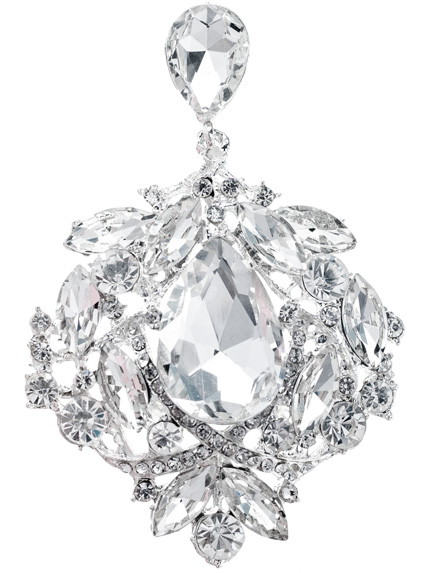 Diamond cutting has evolved through the years as new technologies and new cut parameters have been developed. Some of the earliest diamonds found in jewelry were from the Roman era and were used in their natural form. Later, skilled artisans, who had only their trained eye to rely upon, began to cut diamonds using hand tools. The table cut — generally considered to be the first cut — was created when the tip of a rough diamond was cut off, leaving a large, flat table-like surface. During the 1500s and 1600s as more diamonds mined in Brazil and India made their way to Europe, artisans still working by hand began to experiment with creative ways to cut diamonds. Rose cuts and old mine diamonds were among the first cuts achieved. Since these diamonds were all cut by hand, each one is slightly different, giving them their own special charm and unique personality. As new technology came about with the advent of electricity, the Old European cut was created, the first truly round diamond. It is widely considered to be the precursor to the modern-day round brilliant diamond.
Diamond cutting has evolved through the years as new technologies and new cut parameters have been developed. Some of the earliest diamonds found in jewelry were from the Roman era and were used in their natural form. Later, skilled artisans, who had only their trained eye to rely upon, began to cut diamonds using hand tools. The table cut — generally considered to be the first cut — was created when the tip of a rough diamond was cut off, leaving a large, flat table-like surface. During the 1500s and 1600s as more diamonds mined in Brazil and India made their way to Europe, artisans still working by hand began to experiment with creative ways to cut diamonds. Rose cuts and old mine diamonds were among the first cuts achieved. Since these diamonds were all cut by hand, each one is slightly different, giving them their own special charm and unique personality. As new technology came about with the advent of electricity, the Old European cut was created, the first truly round diamond. It is widely considered to be the precursor to the modern-day round brilliant diamond.
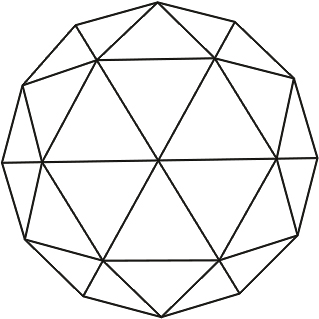
The elegant rose cut diamond has a flat bottom and a dome top that is faceted all around. The facets are triangular in shape. These diamonds originated around the 1500s and have a soft, dreamy feeling to them. The name comes from the resemblance to a rose bud opening up. Rose cuts have become very popular in contemporary jewelry and today many are manufactured in India.
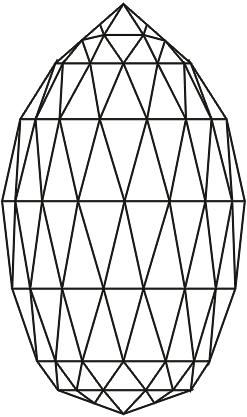 The glamorous briolette is a drop-shaped diamond that has no table and no culet. It has triangular or diamond-shaped facets all around the stone. The old cut briolettes will be slightly uneven or asymmetrical in shape.This shape was very popular in the Georgian, Victorian, Edwardian and Art Deco eras.
The glamorous briolette is a drop-shaped diamond that has no table and no culet. It has triangular or diamond-shaped facets all around the stone. The old cut briolettes will be slightly uneven or asymmetrical in shape.This shape was very popular in the Georgian, Victorian, Edwardian and Art Deco eras.
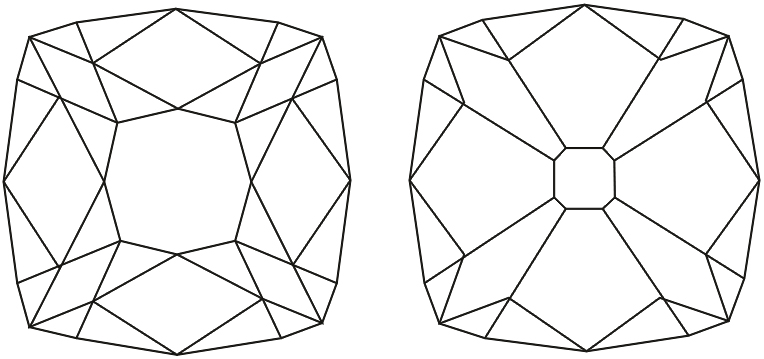
An old mine diamond was cut by following the rough diamond’s octahedral shape. Distinguishing features of an old mine diamond are the high crown, which is the upper portion of the diamond; a small table, which is the flat surface on top of the diamond, and an open culet. The shape of old mine diamonds varies quite a bit. Some are more round, others more square or rectangular, while others are cushion shaped. The end result depended upon the shape of the rough and the skill of the cutter, who had to use his trained eye to trace the form of the rough diamond. Facet sizes and shapes can vary not only from stone to stone, but on the same stone as well, giving each diamond its own distinct character.
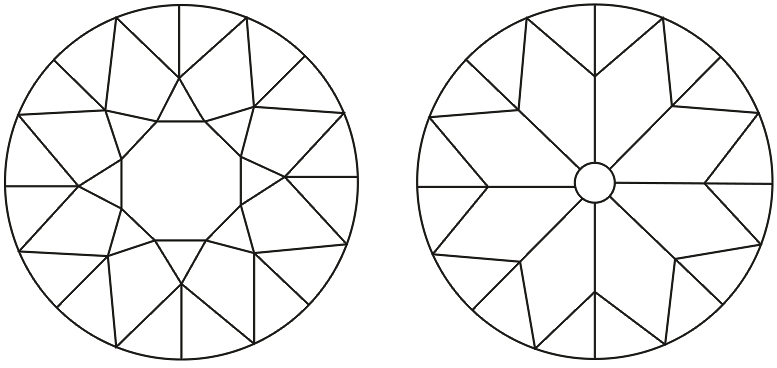
During the late-nineteenth and early-twentieth centuries with the advent of electricity, diamond cutting became more precise as the cutting wheels were able to move faster. The main difference between an old mine and an Old European diamond is that the Old European diamond has a round shape and the open culet is smaller than that of an old mine. Like the old mine diamond, the Old European cut also has a high crown and small table. This classic cut is the precursor to the modern round brilliant diamond that we see today.

